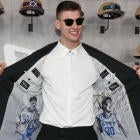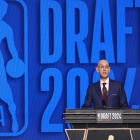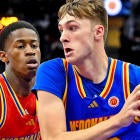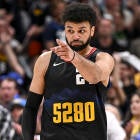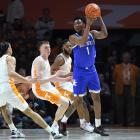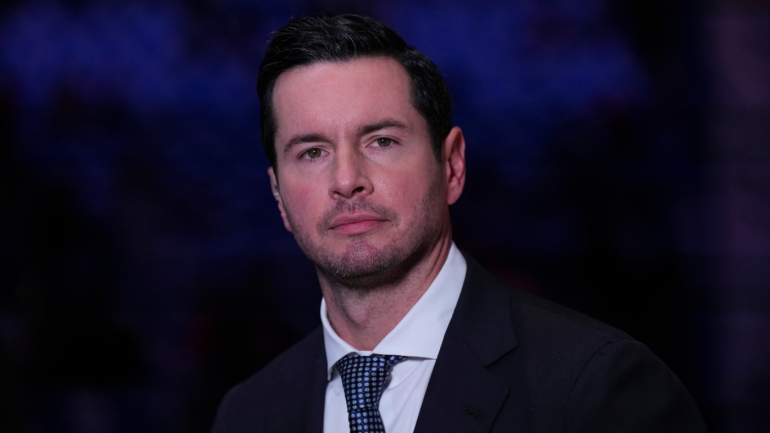
The Los Angeles Lakers are, above all else, star-chasers. This is franchise whose core philosophy more often than not boils down to landing the big fish and figuring the rest out later. For the better part of 60 years, that philosophy has worked, and that success has informed future decision-making.
That much was evident in the way that they conducted their coaching search, which now appears to be culminating with an 11th-hour pursuit of two-time defending NCAA champion Dan Hurley, but was similarly evident in the way that they positioned their other top candidate, ESPN broadcaster JJ Redick.
Redick is a big name in his own right, with a 15-year playing career and very successful early run in the media, but he lacks Hurley's readymade coaching credentials. Before Hurley was seemingly on the table, all of the reporting suggested that the Lakers didn't believe Redick needed such a resume. In May, The Athletic's Shams Charania and Jovan Buha reported that the Lakers view Redick as a "Pat Riley-like coaching prospect."
There are, of course, surface-level similarities between Riley, arguably the greatest Lakers coach of them all, and Redick, a promising newcomer with no experience. Both were decorated college stars at major programs before settling into NBA careers as role players. Both transitioned from playing into broadcasting—though Riley was a championship assistant before ascending into a head coaching role.
That last caveat is important, as the Redick-Riley similarities, at this stage, really are just surface level. Redick, given time to grow into coaching as Riley did when he was an assistant, might one day become a great coach. Unfortunately, new coaches aren't afforded that time when they draw comparisons to Hall of Famers. And it's not time the Lakers tend to give any of their coaches. Whoever they hire in this cycle will be the seventh Lakers coach since Phil Jackson retired in 2011. Frank Vogel was fired two years after a championship. Darvin Ham was fired one year after a Western Conference finals berth. Anything less than significant and sustained winning in Los Angeles puts coaches on the hot seat.
And first-time coaches, as Ham learned firsthand, aren't finished products. We're seeing this play out in the current postseason. Jason Kidd spent one year with the Brooklyn Nets, attempted a coup for front office power, failed, and fled to Milwaukee in response. He got so much wrong as head coach of the Bucks that when Mike Budenholzer took over, he immediately improved the team's record by 16 games through some fairly basic tweaks.
Now, Kidd has taken the Dallas Mavericks to the Finals. Joe Mazzulla nearly got there a year ago. When the Boston Celtics lost the Eastern Conference Finals to the Miami Heat, he was the popular scapegoat. The Celtics held firm. He may well win the championship this season. Even Riley-level coaching prospects need proper seasoning.
Redick might have gotten the time he needed with Toronto or Charlotte, two other jobs he's interviewed for. It probably wouldn't happen with the Lakers, and getting fired by such a high-profile team could impact his future career prospects irrevocably. Ham is not known to have interviewed for any head coaching jobs since getting axed by Los Angeles. He was a popular target before taking the job. In that sense, potentially losing the job to Hurley might be a blessing in disguise for Redick. In fact, given the disconnect between perception and reality that the Lakers are facing right now, he might just be dodging the bullet that would have killed his coaching career.
Here's another surface-level connection between Redick and Riley: when Riley took over the Lakers in 1981, he inherited a team that had already won a championship led by a perimeter star (Magic Johnson) and a dominant big man (Kareem Abdul-Jabbar). Technically, the next coach of the Lakers will be inheriting the same situation.
The Lakers won the championship in 2020. Their perimeter star, LeBron James, is still in place. Their interior star, Anthony Davis, is still in place. The immediate expectation for the Lakers might not be championship or bust, but they fired Ham because a single first-round exit (and the underwhelming regular season that led up to it) was viewed as a significant disappointment. The Lakers might not have a path to anything better any time soon, and setting higher expectations for any new coach means setting them up for failure.
It may seem hard to believe, but Davis is entering his 13th NBA season. Abdul-Jabbar was in his 13th NBA season when Riley took over. Johnson was in his third. James is in his 22nd. James and Davis combined to play 147 games last season, and the Lakers still only won 47 games. They averaged 103.5 combined games in the previous two seasons. If the James and Davis duo regress to the mean, 47 wins becomes 40, or perhaps even the 33 they won during the 2021-22 season, pretty quickly. Laker lineups featuring James and Davis outscored opponents by 4.6 points per 100 possessions last season, according to Cleaning the Glass. Remove James and suddenly the Lakers get outscored by 0.2 points per 100 possessions. Without both? The Lakers get outscored by 13.2 points per 100 possessions.
They could fortify the roster on the trade market. The Lakers have three first-round picks to dangle for either a third star or role players, and even have pathways of dangling other draft assets (swaps, seconds, protected portions of already-outgoing picks) if they really need to. The trouble they're facing in the short-term is that adding anyone of note will mean sending someone else meaningful out in their place. The Lakers are fairly limited in terms of matching salary at the moment.
D'Angelo Russell has a player option. If he declines it, the Lakers can't trade him (barring an unlikely sign-and-trade scenario). Austin Reaves is underpaid. Gabe Vincent and Jarred Vanderbilt are both hovering around $11 million in salary, but after missing most of last season due to injury, don't have much trade value at the moment. The Lakers turned last season around when they moved Rui Hachimura into the starting lineup. Trading his $17 million salary might be necessary, but it would be painful.
Turn a handful of those players into, say, Trae Young, Darius Garland or Donovan Mitchell, and the new, restrictive collective bargaining agreement prevents you from paying for a supporting cast around your new three-headed monster. Split those assets into multiple new role players and you suddenly lack the star power to stay afloat if James or Davis has an extended absence. The Lakers are 55-64 without Davis since acquiring him in 2019. They are 50-72 without James since he signed in 2018. There's no obvious, short-term answer to this team's woes. Even if they find one, it would probably cost them the majority of their future draft capital. Would you want to coach a team built around a soon-to-be 40-year-old without future picks to fall back on?
So, say the Lakers take the long view. They hold onto their picks, allow James and Davis to slowly age out of stardom and resolve to rebuild the old fashioned way after they're gone. That's probably the team's best long-term path, short of moving James and Davis now, but it's one that would involve a whole lot of losing.
Take a look at the Western Conference. Almost every team that made the playoffs this season figures to be roughly as good or better next year except for the Clippers, who might lose Paul George. The Grizzlies, the conference's No. 2 seed in back-to-back seasons, will be back to full strength. The Rockets want to start winning. The Spurs could start winning the moment they decide to aggressively pursue veteran upgrades.
At a certain point, a conference just runs out of playoff spots. If the Lakers couldn't escape the Play-In round with James and Davis younger and healthier than they will ever be, what does their future look like when those two are older and banged up in a deeper conference? Not great. A coach might be able to survive a few down years with an aging core. He might be able to survive the few down years that come afterward, when the front office transitions to a youth movement and starts to rebuild through the draft. It is rare for a coach without a lengthy history of winning to survive both.
Redick truly might be a Riley-level coaching candidate. His work as a broadcaster has drawn widespread praise. He clearly understands the principles that lead to winning in the modern NBA. His preexisting relationship with James through their Mind the Game podcast indicates a degree of buy-in from a superstar that many first-year coaches don't get. One day, Redick will almost certainly be a head coach. Under the right circumstances, he could be a very good one.
But that's the secret to Riley-level coaching careers. It's almost always circumstance. What if it hadn't been the Lakers that had hired Riley as an assistant in 1979? What if his coaching career had begun with a more traditional team, where he didn't have Johnson and Abdul-Jabbar in place? Would he have lasted long enough to prove that he was the coaching giant he would one day become?
This exercise works for practically every coaching legend. Jerry Krause, the general manager who held the keys to Michael Jordan's prime, plucked Phil Jackson out of the Puerto Rican league to serve as an assistant under Doug Collins. What if, instead of Krause, the general manager of a lesser team had given him that same chance? What if Gregg Popovich hadn't won the Tim Duncan lottery? What if Steve Kerr had taken the Knicks job Jackson offered to him instead of the same position with Golden State? Where would Mazzulla be right now if Ime Udoka hadn't been suspended?
The truth of most great coaches is that they are made, not born. There are no Riley-level coaching prospects because no coach can predictably land in the circumstances that allowed Riley to flourish so quickly. Redick could have Riley's basketball acumen and his force of personality and every other trait that made him one of the greatest coaches of all time and it wouldn't matter if he took over a team that couldn't stay healthy, or couldn't acquire the right players, or couldn't do any of the other dozens of things it takes to compete for NBA championships in time to protect his long-term job security.
All of these things apply to Hurley on some level. Here's the difference: if Hurley fails in the NBA, he immediately becomes the hottest head coach on the college market. That's what winning two national championships does for you. He'd be risking very little by taking any NBA job. This is all reward for him.
But Redick has no coaching experience at the collegiate or professional level. If he lands the Lakers job and it goes south, he has no prior coaching experience to fall back on. His entire resume becomes one misfire. Once you've been fired from the first job, it becomes significantly harder to land the second.
Redick may one day have Hurley's star power. He might eventually grow into the sort of coach that could expect to immediately become a candidate for other desirable jobs if his current position doesn't pan out. But now, before he's taken a single job, it's probably in his best interests to look for one that can afford him the time and space he'll almost certainly need to grow into the kind of coach the Lakers seemingly believed he can one day become.











